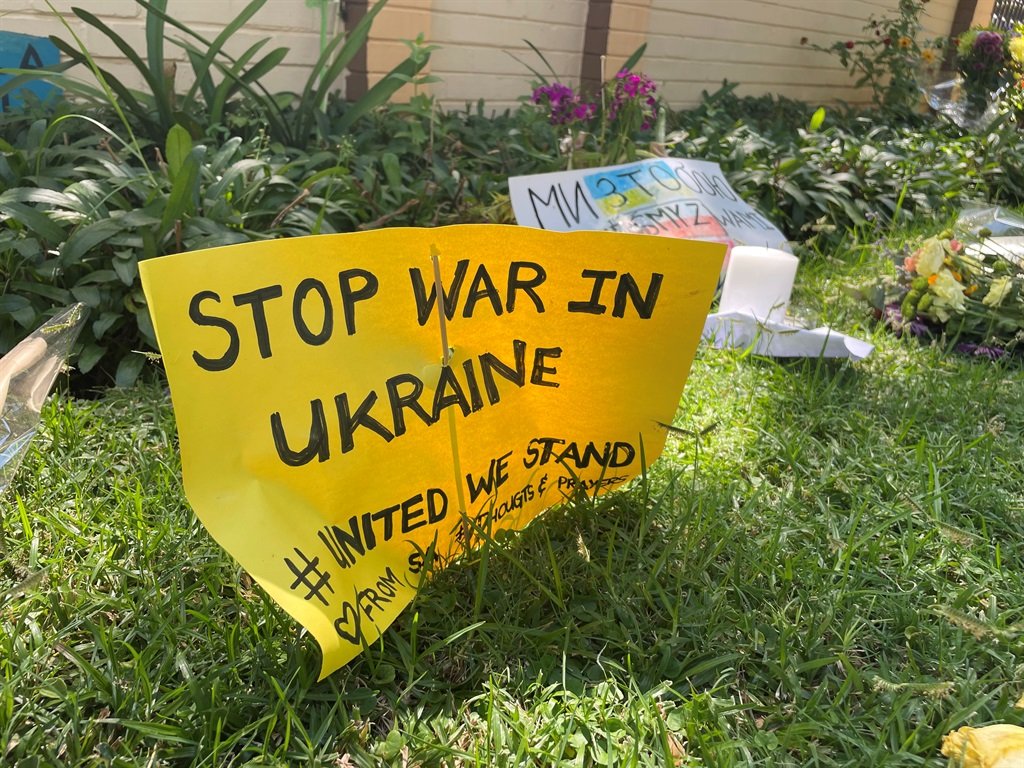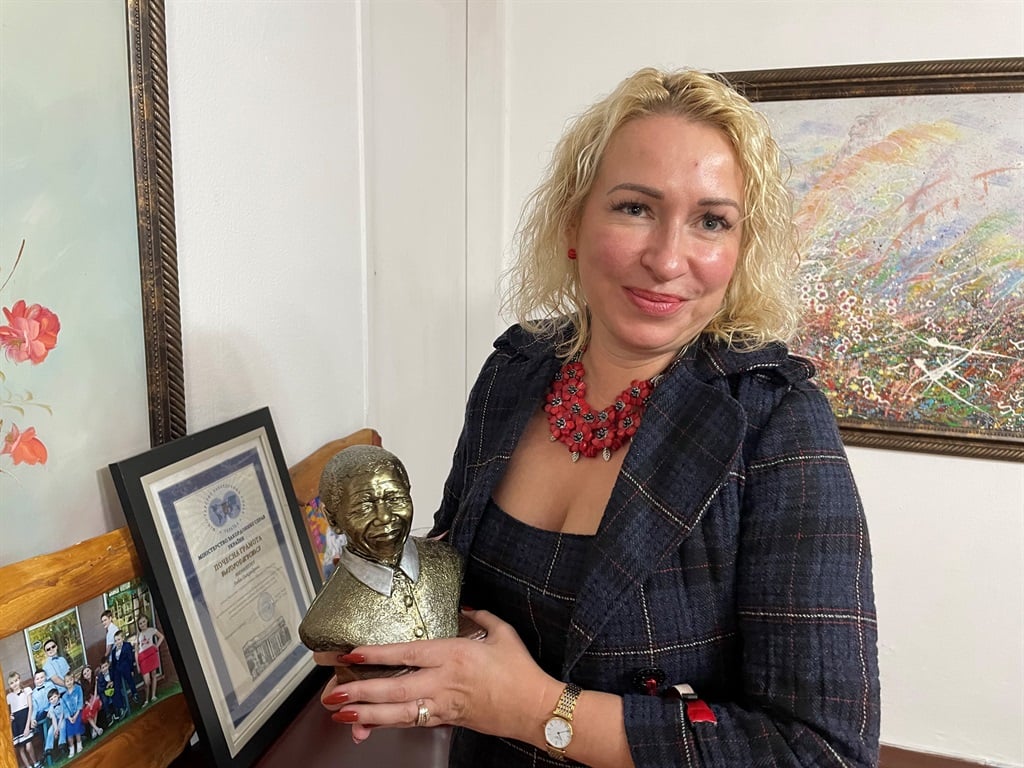Ukraine Ambassador to SA Liubov Abravitova accuses SA of trying to remain friends with both Russia and Ukraine

Message of solidarity piling at Ukraine Embassy in Pretoria
 Ukrainian ambassador to South Africa, Liubov Abravitova, in her office in Brooklyn, Pretoria (James de Villiers, News24)
Ukrainian ambassador to South Africa, Liubov Abravitova, in her office in Brooklyn, Pretoria (James de Villiers, News24)
The Ukrainian ambassador to South Africa, Liubov Abravitova, believes that if enough civil society pressure is placed on the state, it can help to change the South African government’s position regarding Russia’s war in Ukraine. Abravitova speaks to James de Villiers about why she believes Putin won’t be hesitant to use nuclear weapons, why international solidarity will end the war, and why she has to remain strong for the sake of the embassy’s staff.
The one thing Ukrainian ambassador to South Africa Liubov Abravitova, 41, is sure of is that South Africa is a democratic country.
Because, while Abravitova is hesitant to criticise South Africa’s diplomatic policy towards Russia’s war in Ukraine, she believes civil society can still change the state’s position.
The South African government, controversially, abstained from a United Nations (UN) vote last week to condemn Russia’s actions, while President Cyril Ramaphosa called for mediation to de-escalate the situation (and spoke to Russia’s President Vladimir Putin on Thursday, but not his Ukrainian counterpart, Volodymyr Zelensky).

Seated in her office at the Ukrainian embassy in Brooklyn, Pretoria, where several embassies are located, Abravitova shakes her head.
“Those countries who abstained or voted against [the UN resolution], they have a kind of responsibility why we couldn’t stop immediately Russian aggression in Ukraine,” she says in a thick accent, hesitant to name South Africa directly.
Her iPhone beeps every other minute with an urgent message coming through, likely updating her about the situation back home, while, outside, Ukrainian soldiers guard the embassy as visitors bring and place flowers and letters of support.
Two South African Police Service (SAPS) officers are also spotted observing the embassy from across the street.  The Ukrainian embassy in Brooklyn, Pretoria (James de Villiers, News24)
The Ukrainian embassy in Brooklyn, Pretoria (James de Villiers, News24)
South Africa wants to stay friends with both
Asked about South Africa’s diplomatic position, Abravitova rubs her chin and takes a breath.
“The diplomatic or diplomatic answer would be that South Africa wants to stay friends with both important partners, with Ukraine and with Russia,” she says.
“But South Africa needs to realise that during apartheid times that it was not Russia, but the USSR (Union of Soviet Socialist Republics), and we had 15 states.”
A bust of former president Nelson Mandela stands proudly on a cupboard in the corner of the room, while a book named ‘Speeches that changed the world’ featuring Mandela’s image lies on her desk.
Abravitova says:Russia cannot take the legacy of what each particular country was doing. How many [South African] politicians of today were trained in Ukraine, not in Russia? Cards of support from South Africans on Abravitova’s desk (James de Villiers, News24)
Cards of support from South Africans on Abravitova’s desk (James de Villiers, News24)
She points to the sunflowers and postcards of support on her boardroom table (one reads: ‘Stand strong, you will overcome’), and says that it is a sign that South African people stand for the principle of human rights.
“What I really believe in is that South Africa is a democratic state. You have one of the highest ranks of freedom of media, freedom of speech. So I do believe that South Africans and their voices matter.”
I ask whether those voices could possibly help to change the government’s position towards Ukraine.
Abravitova closes her eyes, and nods.
After taking a breath, she adds: “We are eager to bring even harsher sanctions [against Russia] as soon as possible. Because as soon as it affects oligarchs, prominent businesspeople, and then ordinary people, they will be not happy, [and] they will try to look what is really happening.”
Her brother will ‘of course’ fight in the war
It has been a traumatic few weeks for Abravitova since Russia embarked on its invasion of Ukraine on 24 February.
While she has a brother, who is still in Ukraine – aged 38 – and who, she says, will ‘of course fight in the war’, she is hesitant to speak about the concerns she has. She says she has to be strong for the other embassy staff, who have family back home.
Her two children and mother are with her in South Africa.
“I only can imagine what pain they [the embassy staff] feel. That is why I cannot allow myself to be emotional, because if they see me down…” she says before interrupting herself, clasping her hands and staring at the wooden table.
Outside, the mid-morning grey skies briefly split to allow a rush of sunlight into Abravitova’s office.
She rubs her arms, saying she has goosebumps:I believe that afterwards when the war finishes, when Russia withdraws troops, when there’s a ceasefire, what will be painful is to see this country, which was so beautiful, and so efficient and helpful to the world, destroyed.
She points to the Ukrainian flag that stands proudly behind her desk, next to the South African flag.
“That’s why we have our flag, yellow and blue: The yellow is the wheatfields, and this is the blue sky.
“But we will build it back even better, I’m sure. But, today, we just need to save those innocent people being killed.”  Ukrainian ambassador to South Africa, Liubov Abravitova, showing her bust of former persident Nelson Mandela (James de Villiers, News24)
Ukrainian ambassador to South Africa, Liubov Abravitova, showing her bust of former persident Nelson Mandela (James de Villiers, News24)
An estimated 2 000 Ukrainian civilians have died in the ongoing conflict, with between 2 000 and 4 000 Ukrainian soldiers, and between 3 500 and 6 000 Russian soldiers reportedly dead.
A number of key Ukrainian infrastructure has also been targeted by Russian forces, most recently a maternity hospital, where three people died, while 2.5 million Ukrainians are estimated to have already fled the region.
But, many commentators believe that Putin – who accused Ukraine of being run by neo-Nazis (while its president is Jewish) – underestimated Ukraine’s fightback, and suffered dire consequences as a result.
When the war will end
Abravitova says that the war will end as soon as the international society shows solidarity.
One of her staff members brings me a cup of coffee (the Ukrainian emblem proudly visible on the teacup and saucer), and a glass of water.
The Ukrainian Embassy in Pretoria was established in 1993, two years after Ukraine gained independence from the USSR and one year before the first democratic elections in South Africa.
Abravitova became the very first woman to be the ambassador to South Africa in 2020, after coming to the embassy in 2017. She has 19 years of experience in the Ukrainian diplomatic service.
The embassy not only serves South Africa, but also 10 other African countries, including Zambia, Zimbabwe, Mozambique, Mauritius and Madagascar.
Abravitova stares towards the corner of the room and says that she hasn’t spoken to the South Africa’s Department of International Relations and Cooperation, aside from trying to get South African students out of the country.
Of concerns that African, mostly black, students and citizens are being blocked from exiting Ukraine, she says that it is because of other countries’ policies towards non-Ukrainian citizens.
While she shows a map of Ukraine in her diary, she explains: “So between, let’s say Ukrainian and Polish border, you have this grey zone. If you allow all these people with uncertain futures to leave Ukraine, how are they going to cross over to be in this grey zone? They are just going to be stuck in this 30 kilometres area.”
Her phone vibrates as a call comes through, and I encourage her to take it. As her hands somewhat shake, she answers. It is her mother’s South African doctor phoning to express his condolences with the situation in Ukraine and his outrage with the South African government – who, he says, “does not represent the views of the people which is 100% behind Ukraine”.
Abravitova smiles as a tear forms in the corner of her eye.
She tells the man over the phone:I think Africa always stands to support the strongest. So as soon as we show today that we are stronger, I do believe that we can change the government’s position as well, just gradually. So let’s hope for this.
Putin ‘miscalculated’
Uncomfortably, she stares at her phone after ending the call.
She stands up and invites me for a smoke on the embassy’s patio.
“In times of war, you can you allow yourself an informal conversation,” she says smiling, seated on a patio chair and lighting up a cigarette.
–-City Press







